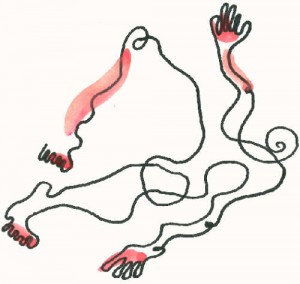Benefits

Illustrations by Jori Baldwin
A lot of people find their way to Feldenkrais because of pain, injury or chronic health conditions.This makes sense. The method is based on moving within your range and never overriding pain. The lessons are just as effective when done purely in your imagination, so no matter what your limitations, you can immediately benefit. But Feldenkrais works by getting away from concentrating on what is wrong with you. It’s not that you ignore the reality, but you practise diffusing your attention and taking the larger context into account.
Here’s a quote from Moshe Feldenkrais which I like:
Most people spend their lives using their strengths to overcome or cover up their weaknesses. Those few who use their strengths to incorporate their weaknesses, who don’t divide themselves, those people are very rare. In any generation there are a few and they lead their generation.
To me, this speaks not just to what can happen within the individual, but to what could happen within society as a whole if we stopped dividing ourselves into “sick” and “well.” Feldenkrais is not a therapeutic modality but an educational one. It allows you to see choices where you might previously have seen unalterable facts. This leads to a freshness and spontaneity that informs every aspect of life.
Here’s another quote:
The lessons are designed to expand the boundaries of the possible, to turn the impossible into the possible, the difficult into the easy and the easy into the pleasant.
To me, thinking about continuous improvement and endless possibilities is more useful than trying to fix what is wrong. Attending regular classes can have lots of health benefits, but it’s really a way of keeping your curiosity and creativity – as well your attention – in good shape.